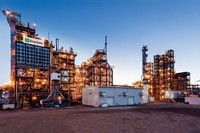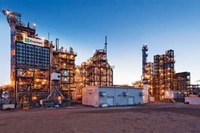Advertisement
Grab your lab coat. Let's get started
Welcome!
Welcome!
Create an account below to get 6 C&EN articles per month, receive newsletters and more - all free.
It seems this is your first time logging in online. Please enter the following information to continue.
As an ACS member you automatically get access to this site. All we need is few more details to create your reading experience.
Not you? Sign in with a different account.
Not you? Sign in with a different account.
ERROR 1
ERROR 1
ERROR 2
ERROR 2
ERROR 2
ERROR 2
ERROR 2
Password and Confirm password must match.
If you have an ACS member number, please enter it here so we can link this account to your membership. (optional)
ERROR 2
ACS values your privacy. By submitting your information, you are gaining access to C&EN and subscribing to our weekly newsletter. We use the information you provide to make your reading experience better, and we will never sell your data to third party members.
Environment
Stephen F. Paul
Princeton University physics professor promotes a domestic designer fuel
by By Marc Reisch
January 16, 2006
| A version of this story appeared in
Volume 84, Issue 3

Stephen F. Paul hangs his hat at Princeton University's Plasma Physics Laboratory, where he does research on thermonuclear fusion. "It will take a long time to make that happen," he says. So in his spare time he has taken on a project with what he hopes will be a quicker payoff: He plans to offer a partial solution to the current energy shortage by taking garbage and turning it into motor fuel.
His is a pipe dream of the best sort: Take the disused pipes and vessels of a government-funded sludge-processing plant that has never run. Rework the plant into a furan chemicals factory. In one end place a variety of cellulosic materials such as agricultural waste, sawdust, and coffee grounds. Put the material through a concentrated acid hydrolysis process. And on the other end collect a stream of methyltetrahydrofuran (MTHF) that can be blended with corn-derived ethanol and natural gas liquids to make a homegrown transportation fuel.
Paul began work on the blends about 10 years ago and patented a series of them in 1997. The patents, held by Princeton University, were licensed to a firm known as Pure Energy Corp., which received approval in 1999 from the Department of Energy for use of the blends under the Alternative Fuel Transportation Program.
The project didn't go so well under Pure Energy, Paul says, "because they couldn't get the money together." He is reluctant to discuss the situation further because of pending litigation, but as a result he has a deep suspicion of venture capitalists and the price they extract to help launch a new company. So he has taken the development of the DOE-approved P-series fuel-the "P" is for Princeton-into his own hands.
Building on his experience with Pure Energy, Paul has taken on the role of chief executive officer in the formation of a new company to make MTHF. He is preparing to lease a sludge-processing facility on the outskirts of Trenton, N.J., and plans to transform it into an MTHF plant. Because Princeton is unwilling to do so, he has also taken on the $35,000 annual cost to maintain a portfolio of three U.S. patents and 25 foreign patents now associated with MTHF fuel blends.
To launch his enterprise, Trenton Fuel Works, Paul says he will need to raise $50 million, $2 million of which will go to leasing the former sludge-processing plant for 10 years. So far he has come up with $500,000 from investors. Paul says he is seeking funding from wealthy "angel" investors and companies that make ethanol.
Paul believes he has a better chance to attract investors now that oil prices are high. When Pure Energy first started developing P-series fuel, the only real market for the fuel was government fleets mandated to use such fuels under the alternative-fuel program. But crude oil prices are now approaching $60 per barrel, and, Paul says, "I can make a competitive fuel when oil prices are above $38 per bbl."
Oil-rich countries aren't shaking in their boots, Paul admits. Back in 1998, DOE suggested that P-series fuel could displace 1 billion gal of petroleum-derived gasoline. U.S. gasoline consumption exceeds 1.3 trillion gal per year, according to the U.S. Energy Information Administration. Paul also realizes that "energy is a tricky business" and that prices for motor fuel can fluctuate. But he is counting on prices staying relatively high.
Once Paul completes the work to reconfigure the former sludge plant, it would make 3 million gal per year of MTHF-enough to generate 12 million gal of the P-series formula and run 15,000 cars. Looking northeast, Paul notes that "New York City generates enough waste to supply 10 similar-sized plants and fuel 1.5 million cars a year."
But that is only if Paul is able to prove his case by getting his fuel works up and running. Originally built at a cost of $88 million from federal and local funding sources, the Trenton plant was to be a showcase operation using a novel process to turn municipal sludge into fertilizer. But because similar plants built in the late 1980s failed to operate as planned, the never-used plant has sat idle since its completion in 1992.
Paul says BioMetics, a Waltham, Mass.-based biotechnology design and construction company, is redesigning the Trenton plant to employ the firm's Biofine bioconversion process. BioMetics won the 1999 Presidential Green Chemistry Challenge Award for small business for its successful demonstration of the Biofine process to convert paper mill sludge into levulonic acid, a precursor of MTHF.
Priscilla E. Hayes, executive director of the Solid Waste Policy Group, hosted at Rutgers University, has worked with Paul since 1997 and says she thinks he has a good chance of success. New Jersey has a range of readily available cellulose sources for the plant, she points out, from leaves that would otherwise clog sewers to manure from the state's horse farms to scraps from restaurants and food-processing plants.
Paul says it will take 18 months to reconfigure the pipes in the Trenton plant to turn out the stuff of his dream fuel. If the plant can operate successfully, he'll then be happy to license the technology to others and spend more of his time on thermonuclear fusion.







Join the conversation
Contact the reporter
Submit a Letter to the Editor for publication
Engage with us on Twitter